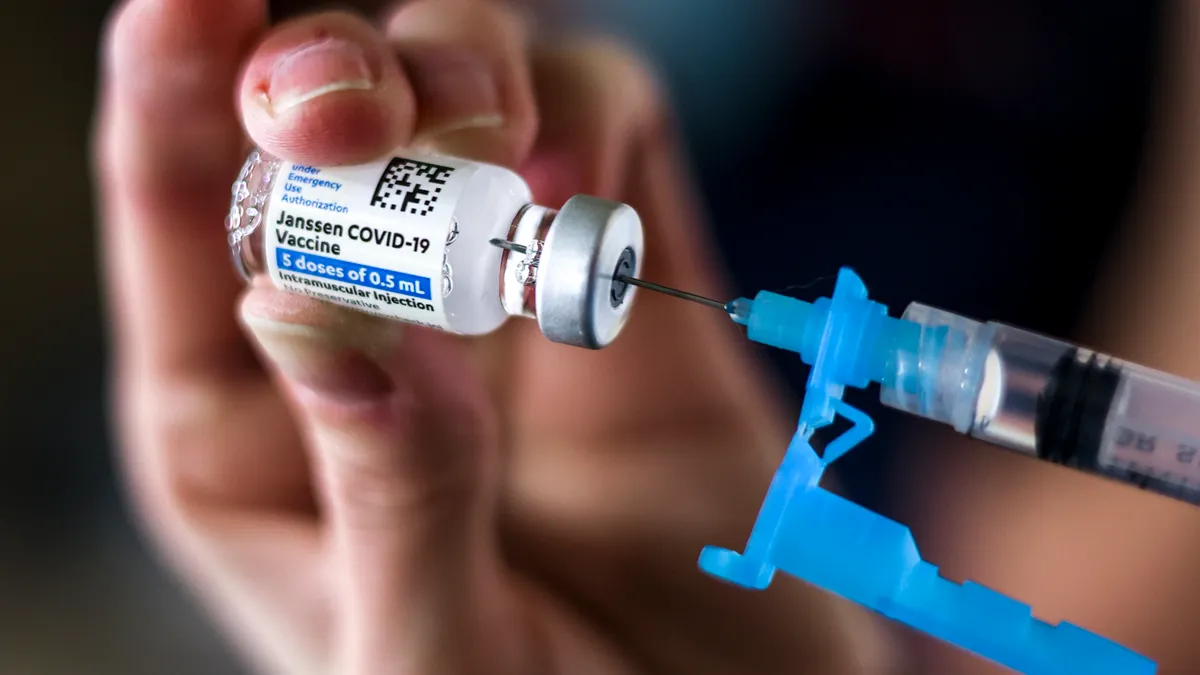Dive Brief:
- A jury must decide whether a former marketing and sales representative objected to her employer’s COVID-19 vaccine requirement because of sincerely held religious beliefs or for reasons that were “truly medical and masked by religious language,” an Ohio federal district court held May 13.
- The sales rep, who identifies as a devout Christian, requested an exemption in 2021, after her employer, a health services company, began requiring that employees get vaccinated against COVID-19, according to court documents in Isensee v. Amplity, Inc. In her request, which her pastor signed, she cited Bible verses and expressed a religious concern about stem cells being used to make the vaccine, court records said. A company review board denied the request.
- After her termination, the sales rep sued the employer for allegedly failing to accommodate her religious beliefs in violation of Title VII of the Civil Rights Act of 1964. “While the Court does not doubt Isensee’s faith,” she made conflicting statements as to the sincerity of her religious beliefs relating to vaccinations, the court said. This raised a “quintessential” question of fact for trial about why she sought the exemption, it ruled.
Dive Insight:
The case raises an ongoing issue for employers: What do they do if an employee’s request to be exempted from a vaccine policy on religious grounds is met with potentially conflicting evidence regarding its sincerity?
The U.S. Equal Employment Opportunity Commission offers a straightforward recommendation: Generally, when an employee or job applicant notifies an employer that a requirement conflicts with their religious views and requests a religious accommodation, the employer “should proceed on the assumption that [the request] is based on sincerely held religious beliefs,” an EEOC guidance says.
If the employer has an objective basis for questioning the religious nature of the request, it can make a limited factual inquiry and seek additional supporting information, the guidance suggests.
A recent settlement highlights what employers should not do. In January, Trinity Health Grand Rapids (formerly Mercy Health St. Mary’s), a hospital and health system based in Michigan, agreed to pay $50,000 to resolve allegations it failed to properly consider a job applicant’s request for a religious exemption from its flu shot policy.
The hospital had offered the applicant a job contingent on a physical and getting a flu shot, according to the EEOC’s lawsuit. The applicant said he would not get the shot due to conflicts with his religious beliefs and submitted a request for an exemption.
Allegedly, without explanation or letting him provide additional information, the hospital deemed the request “insufficient” and denied it, the lawsuit claimed. In announcing the suit, the EEOC explained that the health system should have worked with the applicant if it had questions, rather than rejecting his request outright.
In the Amplity case, an HR director told the sales rep the review board denied her request because her role required in-person “engagements” at healthcare facilities and not getting vaccinated would place her, the company and its clients at risk, according to court records.
The court said the case had to go to trial because the sales rep gave conflicting statements about why she objected to getting vaccinated, raising a credibility issue over whether she was asking for an exemption based on religious or medical grounds.
For instance, in addition to pointing to Bible passages and providing her pastor’s signature, the sales rep expressed a religious concern over being required to “place a foreign substance containing ‘aborted fetal cells and other unknown substances’ in her body,” the court noted.
But the sales rep said that when it came to her children, “she sits down with their nurse practitioner and determines whether the benefits of the vaccination outweighs the drawbacks,” which is “consistent with [her] general approach to medical treatment,” the court said.
She also expressed other medical concerns, stating in her exemption request that she didn’t believe it would be right for her to introduce the vaccine’s substances in her body because the shots were still in the experimental phase and “have not sufficiently been proven to me to be safe and effective,” the court said.













